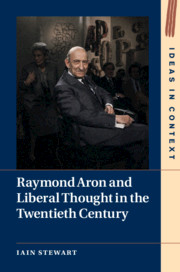Book contents
- Raymond Aron and Liberal Thought in the Twentieth Century
- Ideas in Context
- Raymond Aron and Liberal Thought in the Twentieth Century
- Copyright page
- Dedication
- Contents
- Acknowledgements
- A Note on Translations and References
- Introduction
- Chapter 1 Intellectual Politics and the Crisis of Democracy
- Chapter 2 History and Politics
- Chapter 3 Antitotalitarianism
- Chapter 4 The End of Ideology
- Chapter 5 Raymond Aron and the French Liberal Tradition
- Chapter 6 Raymond Aron and the Liberal Moment in Late Twentieth-Century French Thought
- Conclusion
- Select Bibliography
- Index
- Ideas in Context
Chapter 1 - Intellectual Politics and the Crisis of Democracy
Published online by Cambridge University Press: 18 October 2019
- Raymond Aron and Liberal Thought in the Twentieth Century
- Ideas in Context
- Raymond Aron and Liberal Thought in the Twentieth Century
- Copyright page
- Dedication
- Contents
- Acknowledgements
- A Note on Translations and References
- Introduction
- Chapter 1 Intellectual Politics and the Crisis of Democracy
- Chapter 2 History and Politics
- Chapter 3 Antitotalitarianism
- Chapter 4 The End of Ideology
- Chapter 5 Raymond Aron and the French Liberal Tradition
- Chapter 6 Raymond Aron and the Liberal Moment in Late Twentieth-Century French Thought
- Conclusion
- Select Bibliography
- Index
- Ideas in Context
Summary
This chapter examines the development of Raymond Aron’s distinctive understanding of the intellectual’s role in public life. In contrast to existing accounts of Aron’s intellectual development, it shows that his earliest political engagements as a student had a lasting impact on his intellectual ethic of responsibility. The chapter explains how Aron’s involvement in revisionist socialist and pacifist movements during the late 1920s and early 1930s informed his understanding of political realism. Situating Aron within the context of broader debates over intellectual responsibility and irresponsibility involving authors such as Julien Benda, Paul Nizan, and Max Weber, it then examines Aron’s response to the crisis of French democracy in the 1930s. Here the chapter shows Aron to have been a staunch critic of organised intellectual anti-fascism who was sympathetic to the radical right’s critique of French democracy. Thc chapter concludes by explaining how Aron’s politics in the 1920s and 1930s shared many of the anti-liberal characteristics of the nonconformist milieu in which he was politicised, while at the same time he adopted the reconciliatory historical vision characteristic of the French liberal tradition.
Keywords
- Type
- Chapter
- Information
- Publisher: Cambridge University PressPrint publication year: 2019

